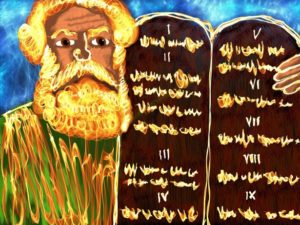One of the greatest burdens that an individual can take upon himself or herself is the responsibility of governing a nation. The act of overseeing the actions of such a large group of people requires abilities that few possess and challenge even the strongest and wisest person in ways that most will never fully comprehend. While a number of people find it easy to criticize those who engage in such governance, few are willing to take on the responsibility and accept the inevitable criticism that comes along with it. To govern a nation is the act of exercising a restraining influence through the right of authority. When God delivered the people of Israel from bondage in Egypt and led them toward the Promised Land, God communicated to Moses governing principles that would enable him to rule over the people of God. What did God communicate regarding governing and how do these principles apply to those who govern nations today?
God began by calling Moses to a place of leadership and by sending him to the people with a purpose and a relationship with which to carry forth his leadership position.
“God said to Moses, ‘I am who I am.’ And he said, ‘Say this to the people of Israel, ‘I am has sent me to you’” (Exodus 3:14).
Leading a people or nation begins with having the right to do so and a relationship with those who are being led. Moses had both the right to rule and the ability to rule because of his relationship with God and the ongoing covenant between God and the people whom he had created. Rulers historically have evoked these two crucial themes as a means of affirming the right to rule over people and to demand obedience from them. A number of civilizations such as the Egyptians and the Romans developed the idea that their rulers were in fact deity and thus their decisions had the divine sanction and as a result could not be questioned. Effective leadership over a people group requires an understanding that a person in leadership only does so by the will of God and through the allowance of God. The Apostle Paul affirmed this concept of authority.
“Let every person be subject to the governing authorities. For there is no authority except from God, and those that exist have been instituted by God” (Romans 13:1).
 While governmental oversight involves a degree of coercion, an orderly society will involve obedience to authority without the necessity of such coercion except in relatively rare circumstances. Paul’s encouragement to be obedient to those who rule over them is not dependent upon the character of the leader or upon the policies which the leader is implementing.
While governmental oversight involves a degree of coercion, an orderly society will involve obedience to authority without the necessity of such coercion except in relatively rare circumstances. Paul’s encouragement to be obedient to those who rule over them is not dependent upon the character of the leader or upon the policies which the leader is implementing.
The essential element is that the person in authority has been put there by God and is ultimately accountable to God for his or her actions as a ruler. Governing a people is, therefore, a role established by God in order to enable the people being governed to live a life that is pleasing to God and that brings him honor. By sending Moses to the people of Israel with God’s personal name, God was invoking his authority over Moses and establishing Moses as a rightful ruler in the eyes of the people. Without such authority governing a person properly and rightly is impossible. God not only commissioned Moses as a leader but gave him a visible tool and the power to establish his authority over the people.
“And take in your hand this staff, with which you shall do the signs” (Exodus 4:17).
The staff was a visible representation of the authority and power given to Moses by God to lead the people. By taking in his hands the staff given by God and by doing the signs that God had given him to do, Moses would visibly stand forth as worthy of leading the people. Following a leader requires not only the belief that this leader is rightfully in the position because of God’s direction, but also clearly seeing him or she demonstrates the ability to lead and exercise power against those who threaten the people. The people of Israel were very aware of the power of the Egyptian government because they had seen it demonstrated. For Moses to assume leadership he had to show that the power that was operating through him, the power of God, was sufficient to lead them and to overcome any obstacles that they would encounter. A leader must be seen as strong in the eyes of the people if they are to follow his or her direction and have the belief that he or she is the person that is able to make the difficult decisions necessary to maintain a people through the struggle and strains of life. God spoke his leadership direction to Moses not just directly, but also through others who spoke with wisdom.
“So Moses listened to the voice of his father-in-law and did all that he had said. Moses chose able men out of all Israel and made them heads over the people, chiefs of thousands, of hundreds, of fifties, and of tens. And they judged the people at all times. Any hard case they brought to Moses, but any small matter they decided themselves” (Exodus 18:24-26).
God used Moses’ father-in-law to help him see that leadership can never be a solitary endeavor.
Leading a nation of people requires a number of people of varying abilities to lead according to various levels of responsibility. God allowed Moses to experience the frustration that comes from attempting to perform the entire task by himself. He then used the wisdom of Moses’ father-in-law to encourage him to lead not alone but by distributing his authority to others as they had the ability and wisdom to do so. Delegation of authority ensures that just rulings are made in a reasonable amount of time and done so by those close to the people involved. In addition, such delegation of authority helps to develop those who will later rise to higher places of authority. Those who demonstrate the ability to lead at lower levels are thus identified and can then rise to higher levels of leadership. God gave Moses an efficient method by which to ensure that critical matters were dealt with at the highest level of leadership while ensuring that the governing of the nation was not bogged down by small details that could be dealt with by those at lower levels of authority and ability. Such a model for governing a nation will allow it to grow without such governance becoming unwieldy. The willingness to release authority downward is a sign of godly wisdom and humility before God and others. Such an approach requires humble, servant leadership that is best for all being governed.
The principles of governing a nation were set down by God to Moses.
Being a leader requires an understanding that God created all things, including all people, and thus governing people is a service done to God and a responsibility given by God to those who hold such places of leadership. Leading requires the right to rule and the visible ability to rule. God supplied Moses with God’s personal name and with the visible means to act to counter the powers that would act against the people over whom Moses was chosen to rule. Such leadership was not to be solitary but designated to others who would exercise the responsibility that their abilities allowed. When leadership is so ordered, God is pleased and the people are able to live in a way that both honors God and is best for their own personal development. Leadership is thus not a matter of imposing on others through brute force but of leading them in the best way possible through rightly designated authority, wise rule, and appropriate delegation of authority that ensures that the governing of the people is done both justly and expeditiously. Proper governing focus on the essentials while enabling others to carry out the day to day functions that enable a society to survive and thrive.






